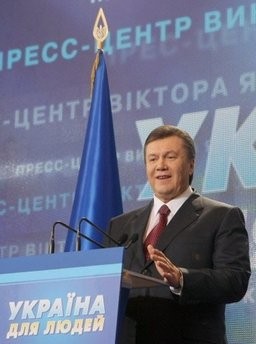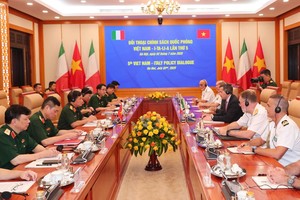Pro-Russia candidate Viktor Yanukovich was on course to winning Ukraine's presidential election, results from the majority of polling stations showed Monday, in a stinging rebuke to leaders of the 2004 Orange Revolution.

Yanukovich had 48.9 percent of the vote while his opponent, Prime Minister Yulia Tymoshenko, had 45.4 percent, the Central Elections Commission said, based on results from more than 74 percent of polling stations.
Another 4.5 percent of ballots were cast for "against all" in Sunday's bitterly contested run-off in Ukraine, an ex-Soviet republic strategically located between Russia and the European Union. Some 1.2 percent of ballots were spoiled.
The results pointed to a stunning comeback for Yanukovich, who had been poised to grab the presidency in 2004 before the Orange uprising swept him aside and brought a pro-Western government to power.
Exit polls forecast he would win with a lead of three to five percent over Tymoshenko, a charismatic politician who championed EU integration during her campaign and was a key leader of the Orange Revolution.
Turnout across the country was 69 percent, the elections commission said.
In a victory speech late Sunday, Yanukovich said the election had opened a "new page" in Ukraine's history and reached out to Tymoshenko supporters after the divisive campaign.
"I will do everything to ensure that citizens of Ukraine -- irrespective of where in the country they live -- feel comfortable and calm in a stable country," he said, in a nod to the country's geographic divisions.
Ukraine is split between a Russian-speaking east, which is Yanukovich's stronghold, and a Ukrainian-speaking west that backed Tymoshenko.
Tymoshenko, who had repeatedly accused the Yanukovich camp of plotting to rig the vote, did not concede defeat.
"So long as the last count is not made, it is impossible to talk about any kind of results," she told reporters, while her right-hand man, Deputy Prime Minister Olexander Turchynov, spoke of "extensive falsifications."
Tymoshenko had previously vowed to mobilise her supporters for street protests if she detected fraud by her rival.
Yanukovich's campaign seemed ready to counter that threat, setting up dozens of tents and sending hundreds of supporters around key official buildings in Kiev over the weekend.
The Orange Revolution broke out after Yanukovich was declared the winner of a disputed presidential election in 2004. Thousands poured into the streets to protest vote fraud and Kremlin meddling in the election.
After the protests, Ukraine's supreme court threw out Yanukovich's victory as fraudulent and ordered a re-run, which he lost to pro-Western President Viktor Yushchenko.
But Ukrainians grew frustrated as Yushchenko seemed incapable of running the country, let alone realising ambitious dreams of bringing Ukraine into NATO and the European Union.
He feuded with Tymoshenko and the government seemed unable to cope with an economic crisis that saw Ukraine's GDP plunge 15 percent last year.
Yushchenko was eliminated in first-round presidential polls in January where he got less than six percent of the vote.
During the campaign, the media-savvy Tymoshenko was a striking contrast to the uncharismatic Yanukovich, who drew ridicule for his inarticulate speech and was criticised for his criminal record.
Yanukovich was convicted and served prison time for theft and assault in the Soviet era, though his convictions were erased by the courts in 1978.
He hired US political consultants to improve his image and emphasized the importance of Ukraine's ties with Europe in a bid to shed his reputation as a Kremlin puppet.








)















